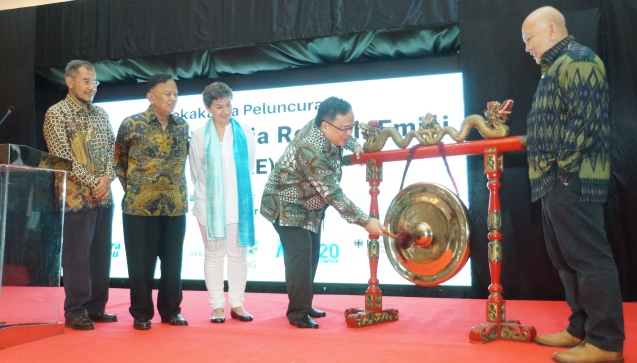Launching of Indonesia Low Emissions Network "JIRE"

Network „JIRE“ sets out to strengthen partnerships for low carbon development.
In February 2019, the network for sustainable low carbon Indonesia, called Jejaring Indonesia Rendah Emisi (JIRE) was launched in Jakarta. JIRE works under coordination of the local civil society organisation Yayasan Mitra Hijau (YMH). The network aims to strengthen partnerships between state and non-state actors to help governments in developing and reviewing low carbon development related policies. In addition, it seeks to assist governments when it comes to improving and distributing information and knowledge on low carbon technology, sharing best practices amongst the members, and bettering access to low carbon financial resources. Finally, expanding private sector involvement in implementing low carbon development policies in Indonesia is a purpose as well.
Supported by the IKI project Shifting Financial Flows to Invest in Low Carbon Development in Southeast Asia (SHIFT SEA), YMH is now promoting the shift of financial flows away from high emission fuels into low emission pathways, to assist the Government of Indonesia to achieve the national emissions reduction target. YMH works to build a communication platform for low carbon development together with Climate Action Network International, Sustainable Energy for ALL (SEforALL), Third Generation Environmentalism (E3G) and Mission 2020 (M2020).
JIRE’s launch was attended by the former UNFCCC Executive Secretary, Ms. Christiana Figueres, together with the Minister of National Development Planning, Prof. Bambang Brodjonegoro, and Indonesia President’s Special Envoy for Climate Change, Prof. Rachmat Witoelar.

“Collaboration across and between sectors was fundamental to delivering the Paris Agreement and is fundamental to its continued implementation. This new multi-stakeholder initiative for deeper collaboration will help to ensure that Indonesia is a central player in bringing the clean air, clean energy future closer.” said Ms. Christiana Figueres, Convenor, Mission 2020 and former Executive Secretary of the United Nations Framework Convention on Climate Change.
“There is a real opportunity now for Indonesia to more deeply embed a low-emissions pathway in its medium and longer-term development plans, and I’m hoping we hear more about these new ambitions from Indonesia and many other countries at the UN Secretary-General’s Summit in September”, added Ms. Figueres.
Achieving the emissions reduction target is a complex task, including the need to integrate policies at the national and the sub-national levels. With limited resources (financially and technically), the government will not be able to achieve the country’s emissions reduction target on its own. Therefore, support from companies, investors, sub-national actors and civil society is needed.

JIRE was created by Indonesian non-state actors to support the government’s efforts to achieve its low carbon emissions target. They range from the business sector, civil society organisations (CSOs), scientists, academics, field practitioners, educators, community leaders, as well as communities. Additionally, financial institutions, investment funds, and other organisations. They can participate together, present, and mobilise capital, information, incentives, and provide facilities for infrastructure and sustainable technology development.
“This demonstrates that low carbon development is not only a government programme but is also becoming the need of non-state actors. Together we can achieve our national emissions reduction target,” said Dicky Edwin Hindarto, representing Yayasan Mitra Hijau (YMH), the founder of JIRE.
Prof. Bambang Brodjonegoro, Minister of National Development Planning of Indonesia, pointed out that “JIRE will be a good national partner for the Government of Indonesia to implement Low Carbon Development Planning in the upcoming National Medium-Term Development Plan. The Government of Indonesia will need such support to achieve our national emissions reduction target.”
Prof. Rachmat Witolear underlined that, “Global action for climate change is still far below our target to save humans and other living beings from disasters caused by climate change. All parties should feel the urgency to increase climate change action ambitions. Non-state actors hold the key to accelerate the increase in climate actions. Cooperation between parties is needed so that we are not only mere surviving the impacts of climate change, but we can thrive, building an attractive and sustainable future”.
To date, YMH has received initial commitment and willingness to join the JIRE from more than 60 individuals and organisations, ranging from state and non-state actors including business community, industries, CSOs, researchers, academicians, and practitioners, who have the same vision for a better future – the vision of low carbon and sustainable development in Indonesia.
The link has been copied to the clipboard
Contact
IKI Office
Zukunft – Umwelt – Gesellschaft (ZUG) gGmbH
Stresemannstraße 69-71
10963 Berlin



